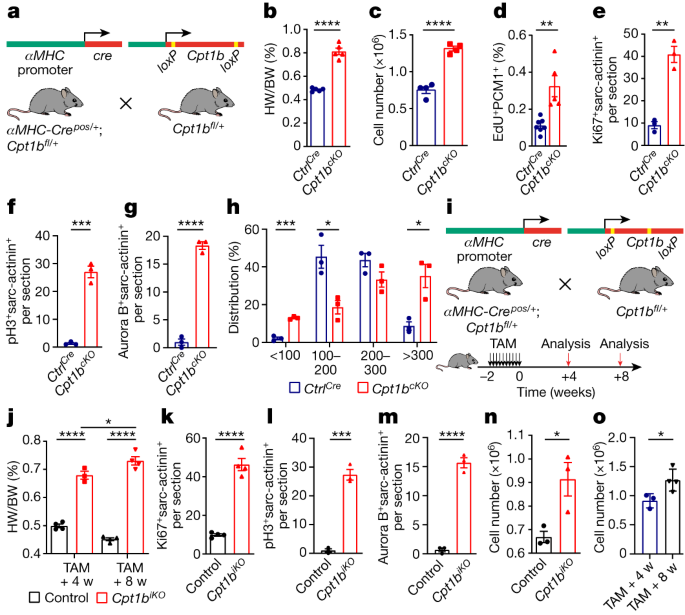2023-10-20 マックス・プランク研究所
◆マウス実験で、特定の遺伝子を無効にすることで心臓が再び成長し、心臓発作後にもほぼ完全な回復が見られた。この研究は、将来的にヒトに適用できる心臓再生の治療法の可能性を示唆しており、重要な成果とされている。しかし、実用化にはまだ時間と臨床試験が必要である。
<関連情報>
- https://www.mpg.de/20981292/1020-pfor-cardiac-regeneration-becomes-possible-through-reprogramming-of-cell-metabolism-149770-x
- https://www.nature.com/articles/s41586-023-06585-5
脂肪酸の酸化を抑制することで、成体マウスの心臓再生が可能になる Inhibition of fatty acid oxidation enables heart regeneration in adult mice
Xiang Li,Fan Wu,Stefan Günther,Mario Looso,Carsten Kuenne,Ting Zhang,Marion Wiesnet,Stephan Klatt,Sven Zukunft,Ingrid Fleming,Gernot Poschet,Astrid Wietelmann,Ann Atzberger,Michael Potente,Xuejun Yuan & Thomas Braun
Nature Published:27 September 2023
DOI:https://doi.org/10.1038/s41586-023-06585-5

Abstract
Postnatal maturation of cardiomyocytes is characterized by a metabolic switch from glycolysis to fatty acid oxidation, chromatin reconfiguration and exit from the cell cycle, instating a barrier for adult heart regeneration1,2. Here, to explore whether metabolic reprogramming can overcome this barrier and enable heart regeneration, we abrogate fatty acid oxidation in cardiomyocytes by inactivation of Cpt1b. We find that disablement of fatty acid oxidation in cardiomyocytes improves resistance to hypoxia and stimulates cardiomyocyte proliferation, allowing heart regeneration after ischaemia–reperfusion injury. Metabolic studies reveal profound changes in energy metabolism and accumulation of α-ketoglutarate in Cpt1b-mutant cardiomyocytes, leading to activation of the α-ketoglutarate-dependent lysine demethylase KDM5 (ref. 3). Activated KDM5 demethylates broad H3K4me3 domains in genes that drive cardiomyocyte maturation, lowering their transcription levels and shifting cardiomyocytes into a less mature state, thereby promoting proliferation. We conclude that metabolic maturation shapes the epigenetic landscape of cardiomyocytes, creating a roadblock for further cell divisions. Reversal of this process allows repair of damaged hearts.


